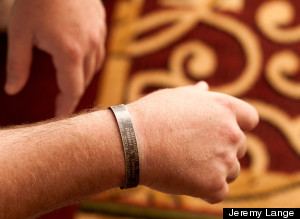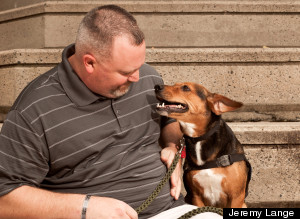DURHAM, N.C. -- A story Mike McMichael's grandma told him when he was young probably saved his life. But that was years after he had grown up to be a National Guard infantry officer, been knocked unconscious by an IED blast in Iraq and come home after a long combat tour with brain injuries the Army never diagnosed.
It was after worsening tremors and memory lapses forced him to quit the military, and after blackouts and violent rages cost him his civilian job and nearly drove away his wife, Jackie, and their four young children.
It was when he felt he'd failed as a warrior and failed as a dependable wage earner and failed as a husband and dad. When suicide began to look like the only option left, it was then that he remembered the story his grandma had told him. She'd been a nurse, and the story went like this.
Many years before, a man in his prime unaccountably had fallen on such hard times that he came to believe suicide was the only way to end his pain. He put a shotgun under his chin and pulled the trigger. The blast blew off his face and part of his brain, but it left him alive and breathing.
For the rest of his life he sat in a chair, unable to speak, alone with his thoughts. Inside, the young Mike imagined, he was silently screaming.
"How did things get so bad in his life that he thought that was the answer?" Mike wondered. In Mike's own darkest moments, when thoughts of suicide were banging up against his zest for life and love for his family, the story weighed on him. He hesitated, perfecting the suicide plan but putting off the decision. "I didn't want to be that guy," he explained. "That's what drug it out."
So far, at least, Mike, now 39, has triumphed over his demons. But it's been close. He is a stocky, well-muscled man whose commanding presence, friendly, backwoods demeanor and liquid Carolina diction camouflage a world of hurt and struggle.
For too long, Mike got no help. For too long, professional help was out of reach. For too long, he resisted what help there was.
In that, he is like too many others, military men and women who remain at risk of suicide.
Invisible casualties, they are combat troops afflicted with brain injury and war trauma. They are victims of military sexual trauma. Aging veterans living alone with deteriorating bodies and minds. The physically wounded who've become addicted to painkillers, and people whose lives are temporarily derailed by the death of a loved one, illness, job loss, homelessness or the breakup of a close relationship.
Follow any case of attempted or completed suicide far back enough and you will find one missed opportunity after another. Mental illness remains difficult to recognize, difficult to acknowledge. Asking for help is hard; many troops remain convinced that seeing a counselor will damage their career. There is a national shortage of mental health care providers. Many find it impossible to sort through the hundreds of programs the military and the Department of Veterans Affairs (VA) offer to individuals and families.
Researchers are now looking at suicide factors that can be detected long before a crisis -- at traumatic brain injury, for instance, the wound that changed Mike McMichael's life. Since 2000, a quarter million troops have been diagnosed with TBI, and many more injuries -- like Mike's -- went undiagnosed because the military didn't start battlefield testing until 2007.
Recent studies have conclusively linked traumatic brain injury to suicidal behavior. But for too many, the military's improved screening and treatment for mental health issues have come too late. Indeed, Mike's trajectory is a common and troubling case, a roadmap of how things go wrong.
UNDIAGNOSED AND UNTREATED
Drawn early to military service, Mike enlisted in the National Guard in 1995 while working for a local power company in Raleigh, N.C. He rose quickly through the civilian and military ranks, getting regular promotions and pay increases at the power company and being selected to become an officer in the Guard.

When war came, Lt. McMichael was a platoon leader in Charlie Company, 1st Battalion 20th Infantry, North Carolina National Guard, and found himself in Iraq's Saladin Province north of Baghdad, where the insurgency was escalating and IEDs were killing with unnerving regularity. A natural leader, Mike was promoted to become the company executive officer, a position in which he felt directly responsible for the lives of 174 North Carolinians. His radio call sign: ManDog Five.
He had several near misses with IEDs, but in late November 2004, two 155-mm artillery shells wired together with a cell phone detonated when insurgents dialed the number from a safe distance. The blast blew his unarmored Humvee off the road; Mike was unconscious for five minutes or more. When he came to, he couldn't hear or see or feel anything, but gradually his blindness opened to tunnel vision and a bit of his hearing came back. He could hear moaning and someone shouting, "MadDog Five's hit!" but it turned out everyone was okay. At least no one was dead or had limbs torn off.
"The way it was, when you got hit like that, you got out of the wreckage and said, 'Whew! We made it!' If you weren't bleeding, pretty much you went on and continued with the mission," he explained. "There was no going to get a head scan or anything like that."
With two weeks left before the battalion was due to rotate home, Mike did what countless other troops have done with a concussion: nothing. His head hurt horribly every day, but he felt deeply responsible for his soldiers and -- like many combat leaders -- he took personal responsibility for their lives. "I had to get those 174 dudes back home safe. Even though my head hurt so bad I couldn't sleep," he said.
"What I'm trying to say is that there was no system to help the macho soldier who's not going to do anything unless he's bleeding out," Mike said. "I knew a concussion ought to be checked out. I didn't know you would possibly have a brain injury." Or that complications from that injury would eventually drive him toward suicide.
When Mike and his soldiers were being processed off active duty at Fort Bragg in North Carolina, they were anxious to get home to their wives and kids. At one point in what seemed like an endless bureaucratic process, Mike filled out a questionnaire about his combat experience and handed it to a doctor behind a window. She nodded and set it aside. Neither he nor the Army ever followed up.
Looking at a copy of that form years later, Mike realized he had checked every indicator of severe post-traumatic stress disorder on the sheet: Were you ever in fear of your life? Check. Felt hopeless, check. Ever see bodies, check; ever see civilian injuries, check. Anxious and sleepless, check. And so on.
"If you look at this thing you'd know, this dude is gonna have trouble and needs to talk it out," Mike said. No one pulled him aside for PTSD counseling, nor was there any screening for traumatic brain injury as there is today.
There was a point where he could have said, yes, I think this is wrong with me, check me out before I go. But you knew, Mike said, "that if you checked yes, I was in a blast and my head still hurts, you're probably going to be in a medical hold battalion forever. And it's gonna be that much longer before you ever see your family."
So home he went, undiagnosed and untreated. In those first months, he said, "You are kind of over-stimulated from all the choices, you're high on life for a while. That's the drug that keeps you going."
'WHERE’S THE OLD MIKE?'
Mike kept up with the National Guard one weekend a month, and took back his old job as lineman for the local power company. Out of some kind of misplaced pride, he didn't admit his problems to anyone. "I had guys that lost legs; what's wrong with me that I can't handle this, there isn't anything really wrong with me. I didn't want to show weakness," he said. He'd get together with his Guard buddies and the subject of mental stress never came up -- even though, he found out later, they were all having the same issues. They just wouldn't admit them to each other.
Mike's trouble started slowly at first. Memory lapses. Fits of pointless anger. Anxiety attacks that left him gasping on the floor. Occasional screaming nightmares. He couldn't shake the memory of his convoy getting ambushed outside Baghdad; a fuel truck had caught fire and Iraqi bystanders burned to death. He was in charge, responsible for getting his guys out of a trap. In his tortured dreams he could see other Iraqis screaming, faces contorted, shaking their fists at him, as he pushed the convoy forward past the wreckage.

All this got bad one night close to Christmas 2005, when he'd been home a year. Something threw him into a black fury. He punched holes in the wall, tipped over the Christmas tree and ripped up furniture while his wife, Jackie, and their boys scampered away and hid. Jackie frantically dialed 911. It took an hour. "I kept calling, begging them to hurry. I told them I have babies here, he will kill us and not even remember it the next morning," she said.
The sheriff's deputy who arrived went for his gun when Mike burst from the house -- bloody from busting his hands on screws and splinters -- brandishing what looked like a weapon (it was a broken piece of chair). The officer had his service revolver out, but he himself was a Vietnam combat veteran who had been through this kind of emotional turbulence and had gotten help.
"I need you to get down on the ground now, sir," he told Mike, and Mike obeyed. He got Mike into his squad car, and rather than throwing him in the county lockup, where his violent rage could break out again, he delivered him to Mike's mother, who kept him safe overnight.
In the morning, Mike found the officer's card in his pocket. Next time, call me, it said in a scrawl on the back. Anytime you need to. Anytime.
He told Mike later that any cop who wasn't a veteran and didn't know what was going on might have shot him, and been justified in doing so.
Mike spent several days in a civilian mental health care hospital, and doctors began trying different medications to calm him down while also trying to keep him alert enough to work. Nothing helped.
At one point months later, Mike dug out a refrigerator magnet he'd been given with the phone number of Army OneSource, a portal for medical, mental health and family support resources. He dialed the number and eventually was put in touch with a civilian psychiatrist. But he felt she had no experience with the military or an understanding of military culture, and after a while Mike stopped seeing her.
His first brush with suicide had come earlier that year, in the spring of 2005. Jackie discovered Mike had lost his ability to manage money; he'd been on thousand-dollar shopping sprees at Target, bringing home "junk." She took away his checkbook and credit cards. His angry outbursts continued. He was back with his National Guard company once a month, but found he could no longer lead his men. He'd stand in front of them without being able to think what to do or say.
"I didn't own up to the fact that something was wrong with me, and ask 'em to check me out and get medicaled out," he said, referring to the process of getting a medical separation from the Guard.
Ashamed, he resigned his commission, "the hardest thing I have ever had to do."
At work, he found his hands trembled so hard it was dangerous for him to handle 14,000-volt power lines. He was given other duties. Once a happy, popular and fast-moving lineman, now he was a shadow of his former self. He had disabling anxiety attacks. "Where's the old Mike?" his bosses would ask him. "We want the old Mike back!" Eventually he was fired, ashamed and terrified to tell Jackie he had failed again.
SCREW RESPECT
The McMichaels' house in rural Franklinville, along the banks of the Deep River, a short drive from Durham, is filled with photos of Mike in happier times. "The old me," Mike said. "I could see it in my face, a happiness and some sparkle. Strong innocence. And seeing Jackie's face, so happy and innocent of how bad a man can get after you marry him. And I wanted so bad to have that innocence again for me to provide that to her."
"But I wasn't the same guy, and I didn't understand it," Mike said.
One day he learned in a phone call that three of his former soldiers, men he'd been with in battle, had died: one by heart attack, one in a car accident. The third, Mike said, died of a drug overdose.
"It broke me," Mike recalled."I was kind of drowning." Suicide "was the only thing that was going to make things right. I felt so worthless, it just seemed like the right answer," he said. The plan was to drown himself in the Deep River, so swift it once powered textile mills. He kept fiddling with the mechanics of it; he'd have to wait until the river flooded after a heavy rain and figure out how to knock himself unconscious.
"The problem was trying to find a way that would definitely do it and look like an accident," Mike said. "Never thinking about what it would look like to my family."
Jackie is a lively brunette with a master's degree in counseling and a growing family, and during this time she was frantically looking to get Mike help. But she couldn't find it. One day she phoned the local Vet Center, a drop-in place with peer counselors that is funded by the VA but free of its bureaucracy. She asked if she could bring in her husband because he needed help quickly. No, she says she was told, he has to come in himself. He has to ask for help.
He's uncomfortable asking for help, she said. He says, guys have lost their legs, help should go to them first, what's wrong with me that I can't handle this? Sorry, she was told. We can't help anybody who isn't ready to come in.
When Mike started talking again about suicide, she realized it was up to her to stop it, to push aside her fear of confronting him. Until then, she'd tried to respect his decisions.
Screw respect, she told herself.
"You're not gonna talk like that anymore," she told Mike in a serious sit-down. "Don't threaten us with that. Because I know the plan and it's a good plan and I know you mean it."
Later, she explained, "I felt if I had not taken that threat seriously, it would only have escalated, and he'd been through so many bouts of anxiety and depression and desperation that he could have easily gone and done something."

She dragged Mike off to the Durham VA Medical Center. It was 2008, almost four years after he was blown up in Iraq. His TBI finally was diagnosed. Doctors listened. Mike got counseling, medication. He took part in a 10-week program for veterans with PTSD at the Salem VA Medical Center, where veterans use role-playing to re-live traumatic combat experiences in which they feel they failed. "You'll have guys telling you, 'Dude, it's okay, you did the best that could be done there, it's okay to let it go,'" Mike recalled.
"It's a fantastic program," Mike said. "I'd always said, don't ever take me to the VA. But I've had amazing experiences with the VA. Every once in awhile I call to thank them for saving my life."
'MY HUSBAND IS A HERO'
Of course, it hasn't been easy, and the McMichaels' future is uncertain. Today, almost nine years after his wartime experiences derailed the life that he and Jackie had imagined, Mike is still in a fragile state. He is unable to handle financial transactions, and still struggles with memory. He regularly sees therapists and doctors, even acupuncturists. He does yoga for exercise and relaxation. His medications seem to be keeping him in balance.
Disability compensation payments from the VA keep the family afloat financially, but only just. The future they'd imagined, one of promotions and pay raises, is gone. Jackie has moved away from her role as wife and settled into a role she describes as more of a manager of her husband, one "which is uncomfortable for me," she allowed.
Mike's headaches are constant and occasionally erupt into blinding migraines that drive him to his knees. Jackie has fought with doctors who've changed his medications and not told her.
"My brother used to say, 'Why do you stay with him?'" Jackie said one day. "Because the man I married wouldn't give up on me. My husband is a hero and he feels immense pride at what he did over there."
Still, she said in a quiet moment, being in the military "you give up so much. I try not to think about it in terms of sacrifice."
As with many who've considered suicide, there's no single, overpowering factor that keeps Mike back from the abyss. No head-smacking insight. No one wrestled him to the ground and took him in handcuffs to the VA. Nothing that dramatic.
Instead it is the constant and steady presence of his wife, friends and other veterans. And his kids. The patient work of doctors and therapists at the VA and elsewhere who help Mike deal with pain and frustration. And -- crucially important to those at risk of suicide -- the absence of guns in his house. Quick access to firearms is the number one factor in suicides among service members and veterans. Sixty percent of military suicides in 2011 were by firearm, according to the Defense Department's most recent annual report.

Jackie, Mike believes, saved his life. He owes her, and their four children, big time. "It's been rough for me, but nothing compared to what I put them through," he said.
"What they've seen dad go through ... I apologize to them, because they never know which dad they're going to get. I can go off like that! And sometimes I don't realize it until I see the scared look on their faces. It shakes them to the core."
Mike has thrown himself into helping other veterans by organizing a group of retired service members who act as peer counselors for veterans in need. That's the missing link, he believes, between veterans struggling with mental health or any other issue, and the resources of the VA.
It should be veterans and their spouses who brief returning troops, he says. They can point out the things they did wrong, the problems they had, and how to avoid those problems and get help. "Instead of those namby-pamby little briefings they give you when you come home," he said, referring to the briefings he got at Fort Bragg. "You need people who've been there, done that, who can say, 'What you're feeling is normal, it can happen and you're not alone, and here's where I found some help.'"
"We gotta do something," he said. "The suicide rates just keep going up and up."
Even as he is immersed in helping other veterans -- he is chairman of the veterans advisory council at the Durham VA -- Mike struggles to manage his own demons. He and Jackie have worked out ways to de-escalate arguments and she has made accommodations to his impaired ability to plan, manage money, even drive.
Sometimes, though, Mike's headaches get so bad that he tells Jackie, "I don't know how long I can live with this kind of pain."
Ask Jackie how Mike is doing and her answer is simple.
"He is maintaining."
This article is part of a special Huffington Post series, "Invisible Casualties," in which we shine a spotlight on suicide-prevention efforts within the military. To see all the articles, blog posts, audio and video, click here.
For a review of warning signs someone may be at risk of suicide, click here. For a list of resources to get free and confidential help, click here. If you or someone you know needs help, call the national crisis line for the military and veterans at 1-800-273-8255, or send a text to 838255.
This story appears in a special Labor Day issue of our weekly iPad magazine, Huffington, available Friday, Aug. 30 in the iTunes App store.
